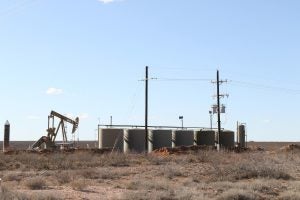Overwhelming public support paves way for stronger oil and gas pollution rules in New Mexico
 Over the past two weeks the New Mexico Environmental Improvement Board heard from a variety of New Mexicans as they considered newly proposed rules to limit oil and gas air pollution in New Mexico. What was striking over the 10 long days of testimony is just how broad and deep the support for a suite of improved rules is across the state.
Over the past two weeks the New Mexico Environmental Improvement Board heard from a variety of New Mexicans as they considered newly proposed rules to limit oil and gas air pollution in New Mexico. What was striking over the 10 long days of testimony is just how broad and deep the support for a suite of improved rules is across the state.
While the board must still deliberate and finalize the rules (expected to happen early this coming spring) it is evident after the hearing that there is a clear, well-supported path to finalizing rules that protect the air and health of New Mexicans and that meet Gov. Lujan Grisham’s goal of setting nationally leading requirements to reduce harmful pollution from the oil and gas industry.
A diverse coalition
These rules are designed to reduce the harmful ozone pollution that creates unhealthy air quality in New Mexico’s major oil- and gas-producing counties. To the credit of the New Mexico Environment Department, their proposed rules already include strong provisions such as comprehensive leak detection and repair inspection requirements without exemptions that ensure pollution leaks at all wells in the state will be fixed promptly.
Overwhelming public support paves way for stronger oil and gas pollution rules in New Mexico Share on XAnd at the hearing, a suite of even more protective standards (more frequent inspections in frontline communities as well as auto gauging on tanks and a find and fix provision for pneumatic controllers — some of the largest oil and gas pollution sources in the state) also received the support of a broad coalition including NMED, environmental and community groups, the National Park Service and even a leading oil and gas producer, Occidental Petroleum. It’s no surprise that New Mexico’s two leading newspapers, the Albuquerque Journal and Santa Fe New Mexican both endorsed strong standards.
Winning the debate
The public also showed up in a strong way throughout the hearing, voicing support for protective standards to reduce oil and gas air pollution each and every day. In the final tally, comments in support of strong rules far outweighed the opposition with 89 of the 125 commentors supporting strong requirements.
And supportive commenters included a diversity of perspectives from public health advocates and members of frontline communities calling on the board to reduce pollution to protect their health, to members of the methane mitigation and outdoor recreation industries highlighting the opportunity for New Mexico job growth through strong rules.
Written comments filed with the board also ran the gamut from investors calling for strong rules to meet the climate crisis head on, to faith leaders from across New Mexico. State legislators including Senate President Pro Tem Mimi Stewart and House Speaker Brian Egolf and local elected officials also called on the board to do their part to cut harmful oil and gas pollution.
What’s next?
The EIB deliberates into the early spring with final rules expected in February or March 2022. The diversity of support garnered for the suite of improved rules from environmental and community groups, as well as state and federal agencies, and the oil and gas industry indicates the strong potential for these improvements to be incorporated into the final rules this spring.
Meanwhile, a few additional improvements also received strong support at the hearing and should be considered as the EIB finalizes their rules. These include:
- Limitations on pollution created during well completions.
- An accelerated transition to zero bleed pneumatic controllers (these key provisions build from what leading states like Colorado require).
Strong, nationally leading NMED rules will build upon the foundation laid by Gov. Lujan Grisham’s Oil Conservation Division which finalized a strong methane waste rule that bans routine venting and flaring earlier this year. And this action could not be more timely as the latest data collected in New Mexico’s Permian shows a substantial pollution problem and as the U.S. EPA readies comprehensive federal standards to reduce pollution from the oil and gas industry.
After years of work from EDF, coalition partners and the Lujan Grisham administration, it’s now up to the EIB to deliver rules that meet the moment, incorporate nationally leading controls and protect all New Mexicans from harmful oil and gas pollution.











